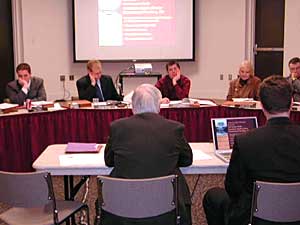U of M makes case for bonding request
February 3, 2004
 |
| U of M President Robert Bruininks faced members of a legislative committee, as he made the case for full funding of the U's bonding request. (MPR Photo/Marisa Helms) |
Minneapolis, Minn. — University President Robert Bruininks says $155.5 million is a modest request for an institution as large as the U of M.
"We think this is a workhorse proposal, not a showhorse proposal," Bruininks says. "I want to make that point, and make it very strongly."
 | |||
Bruininks briefly outlined each of the project proposals for the House Higher Education Finance Committee, which held its hearing on the university's Minneapolis campus. Later the committee toured some of the projects listed in the U's bonding request.
Bruininks says nearly all of what the university is asking for would go toward the maintenance and renovation of its 800 buildings. He says bonding money would be used for things like keeping roofs intact, fixing the interiors and exteriors of buildings.
He warned of costly problems down the road if the projects are neglected. He told the committee underfunding the university would take a serious toll on the university's academic mission and economic impact on the state.
"When you're major league and you're in the middle of a creative innovation economy that is worldwide in nature, you can quickly become a minor league economy. You can quickly retreat back to the 1950s, when Minnesota enjoyed the status of being 29th in the country in per capita income," Bruininks says.
Several of the DFL committee members, including Ron Latz of St. Louis Park, announced they are co-authoring a bill that asks for full funding for the University of Minnesota and the Minnesota State Colleges and Universities bonding request. Latz says he hopes his bill -- not the governor's proposal -- will be the starting point for the committee.
 | |||
"I was particularly frustrated in the last legislative session with the governor. And frankly, this committee broke faith with a long history of funding in higher education in Minnesota," Latz says. "I think we've got an opportunity to show that we are not so hostile to higher education as the last budget would have suggested."
Last session lawmakers and the governor cut the university's state funding by 15 percent, which led to hundreds of layoffs and double-digit tuition increases.
Higher Education Finance Committee Chair Doug Stang, R-Cold Spring, says his committee will likely break with Pawlenty's proposal. Stang says his committee will make a strong case within the House for a few more bonding projects for higher education.
"I think our caucus is very supportive of some of these projects. And, we may disagree with one or two of the projects that the governor's recommended, and so we might do reshuffling," Stang says.
Earlier in the day, the governor told reporters he is not opposed to finding a way to get the university, or higher ed overall, more money in the bonding bill. But he says other projects are competing for the money, and the the bonding bill must stay capped at $760 million.
"For those who would like to redistribute money within the bonding bill to the University of Minnesota, we are happy to have that conversation, and are open to making those kinds of changes, we just want to see where they're going to take the money from," Pawlenty says.
Some lawmakers say they may not be inclined to borrow more money for university projects, because the U received some bonding money last year.
President Bruininks responded that the funding last year was the result of an emergency bill to reinstate projects passed by lawmakers in 2002, but vetoed by then Gov. Jesse Ventura.
|
News Headlines
|
Related Subjects
|

